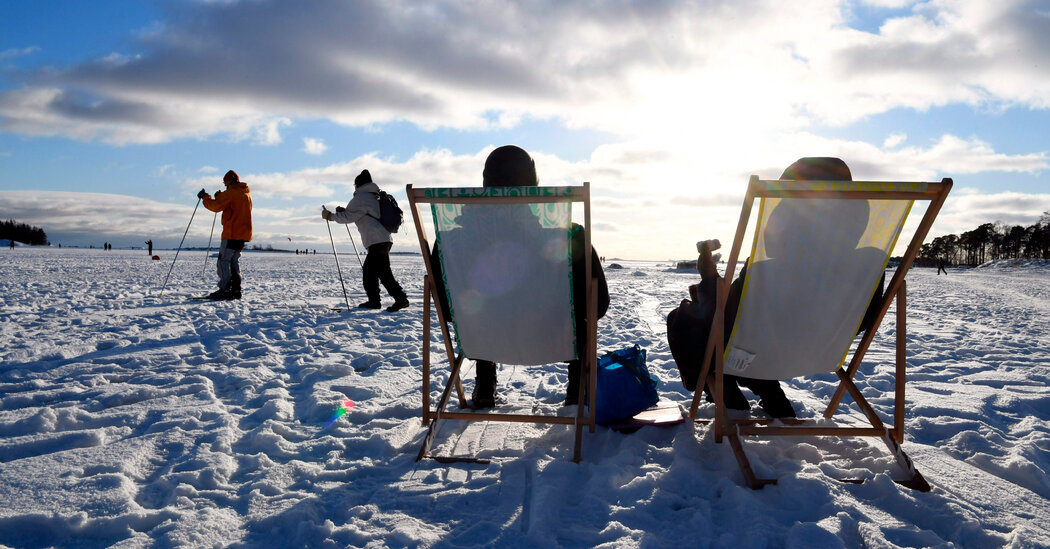Finland Is Again the World's Happiest Country, Report Finds
Finland, for the fourth consecutive year, topped a list of countries evaluated on the well-being of their inhabitants. “Really?” Finns ask.When governments around the world introduced coronavirus restrictions requiring people to stand two meters apart, jokes in Finland started circulating: “Why can’t we stick to the usual four meters?”Finns embrace depictions of themselves as melancholic and reserved — a people who mastered social distancing long before the pandemic. A popular local saying goes, “Happiness will always end in tears.”But for four consecutive years, Finland has been named the happiest country in the world by the United Nations Sustainable Development Solutions Network, which publishes an annual report evaluating the happiness of people around the world.The latest report, published last month, has led some Finns to ask: Really?“Four times in a row is too much,” said Jukka Lindstrom, a writer and standup comedian. The weather is “like the worst day in London, every day,” he said. “There’s definitely something in our history that makes us have this kind of low self-esteem as a nation, always feeling like an underdog.”The World Happiness Report uses data from interviews of more than 350,000 people in 95 countries, conducted by the polling company Gallup. The rankings are not based on factors like income or life expectancy, but on how people rate their own happiness on a 10-point scale.“We believe that these subjective, or self-perceived evaluations are a more reliable way to tell how good life is,” said Shun Wang, professor of the KDI School of Public Policy and Management in South Korea and one of the authors of the report.Questions included, “Did you smile or laugh a lot yesterday?”, “Did you learn or do something interesting yesterday?” and “Were you treated with respect all day yesterday?”Other questions relate to trust. Someone who thought the police or strangers were “very likely” to return his or her lost wallet had, on average, a much higher life evaluation score than someone who thought the opposite, researchers found. .The authors came up with six categories to explain most of the difference in happiness between countries: gross domestic product per capita, social support, life expectancy, freedom to make life choices, generosity and perception of corruption levels. Dr. Wang said some results were surprising: Parts of Eastern Europe ranked relatively low on the list, despite having relatively good income levels, while in South America, the reverse was true: Happiness levels tended to be high, given relatively low income levels.In Finland, a relatively egalitarian society, people tend not to be fixated on “keeping up with the Joneses.” “People often do pretty well in social comparison,” said Antti Kauppinen, a philosophy professor at the University of Helsinki. “This starts from education; everybody has access to good education. Income and wealth differences are relatively small.”David Pfister, an architect from Austria who lives in Oulunkyla, a suburb of Helsinki, said that he would describe Finns as content, but that it was hard to say if they were happy. “The baby has increased our happiness,” said his wife, Veera Yliniemi, a teacher. Another man in the same suburb, Janne Berliini, 49, said he was happy enough. “I have work,” he said. “The basic things are in order.”People in Finland also tend to have realistic expectations for their lives. But when something in life does exceed expectations, people will often act with humility, preferring a self-deprecating joke over bragging, said Sari Poyhonen, a linguistics professor at the University of Jyvaskyla. Finns, she said, are pros at keeping their happiness a secret.The report this year received little attention in the Finnish news media. “Finland is still the happiest country in the world,” began a short article that ran on Page 19 in Ilta-Sanomat, a daily newspaper.All of the countries that ranked in the top 10 — including the four other Nordic countries — have different political philosophies than in the United States, No. 14 on the list, behind Ireland and ahead of Canada. Lower levels of happiness in the United States could be driven by social conflict, drug addiction, lack of access to health care and income inequality, Dr. Wang said.Things in Finland are far from perfect. Like other parts of the continent, far-right nationalism is on the rise, and unemployment is 8.1 percent, higher than the average unemployment rate of 7.5 percent in the European Union.But there is a lot about Finland that is, indeed, great. Aside from the country’s public school system, which rarely tests children and is among the best in the world. College is free. There is a good universal health care system and child care is affordable. And Finland has been one of the least affected European countries by the pandemic, which experts attribute to the high trust in government and little resistance to following restrictions.Heikki Aittokoski, an international affairs correspondent at Helsingin Sanomat, the biggest daily Finnish newspaper, said that what struck him, after traveling to countries including Britain, Bhutan, Costa Rica, Botswana, Denmark and the United States to research happiness for a book, was the ordinary aspects of Finnish life that he had taken for granted.For example, people trust each other, he said. Each morning, it is common in Helsinki to see children as young as 7 walking by themselves with their backpacks to school, feeling completely secure.“That epitomizes the Finnish happiness,” Mr. Aittokoski said. “There’s something we’ve done right.”
Read more →
